Entrepreneurship and Small Business Analysis Report - Module 1
VerifiedAdded on 2023/01/09
|18
|2962
|42
Report
AI Summary
This report examines the multifaceted aspects of entrepreneurship and small business management. It begins by defining entrepreneurship, intrapreneurship, and enterprise, and then categorizes various types of entrepreneurial ventures, including small, scalable startup, large, and social enterprises, along with typologies such as survival, lifestyle, and growth ventures. The report then contrasts the similarities and differences between these ventures, highlighting their core objectives, requirements, and focus areas. Task 2 of the report delves into the interpretation and assessment of data and statistics to illustrate the significant impact of micro and small businesses on the UK economy, including their contribution to GDP, employment, and revenue growth, while also considering their role in innovation. The report concludes by emphasizing the importance of small businesses and business startup growth to the social economy, detailing their contributions in terms of tax revenue, job creation, and the expansion of professional opportunities, and their overall effect on social stability and financial companies.

Entrepreneurship and
Small Business
Management
Small Business
Management
Paraphrase This Document
Need a fresh take? Get an instant paraphrase of this document with our AI Paraphraser


Contents
INTRODUCTION...........................................................................................................................................4
Task 1..........................................................................................................................................................4
P1 Entrepreneurial ventures....................................................................................................................4
P2 Similarities and difference between entrepreneurial ventures..........................................................6
Task 2..........................................................................................................................................................7
P3 Interpret and assess relevant data and statistics to illustrate how micro and small business impacts
on economy.............................................................................................................................................7
P4 Importance of small businesses and business start up growth to the social economy.......................9
Task 3........................................................................................................................................................10
CONCLUSION.............................................................................................................................................14
REFERENCES..............................................................................................................................................15
INTRODUCTION...........................................................................................................................................4
Task 1..........................................................................................................................................................4
P1 Entrepreneurial ventures....................................................................................................................4
P2 Similarities and difference between entrepreneurial ventures..........................................................6
Task 2..........................................................................................................................................................7
P3 Interpret and assess relevant data and statistics to illustrate how micro and small business impacts
on economy.............................................................................................................................................7
P4 Importance of small businesses and business start up growth to the social economy.......................9
Task 3........................................................................................................................................................10
CONCLUSION.............................................................................................................................................14
REFERENCES..............................................................................................................................................15
⊘ This is a preview!⊘
Do you want full access?
Subscribe today to unlock all pages.

Trusted by 1+ million students worldwide
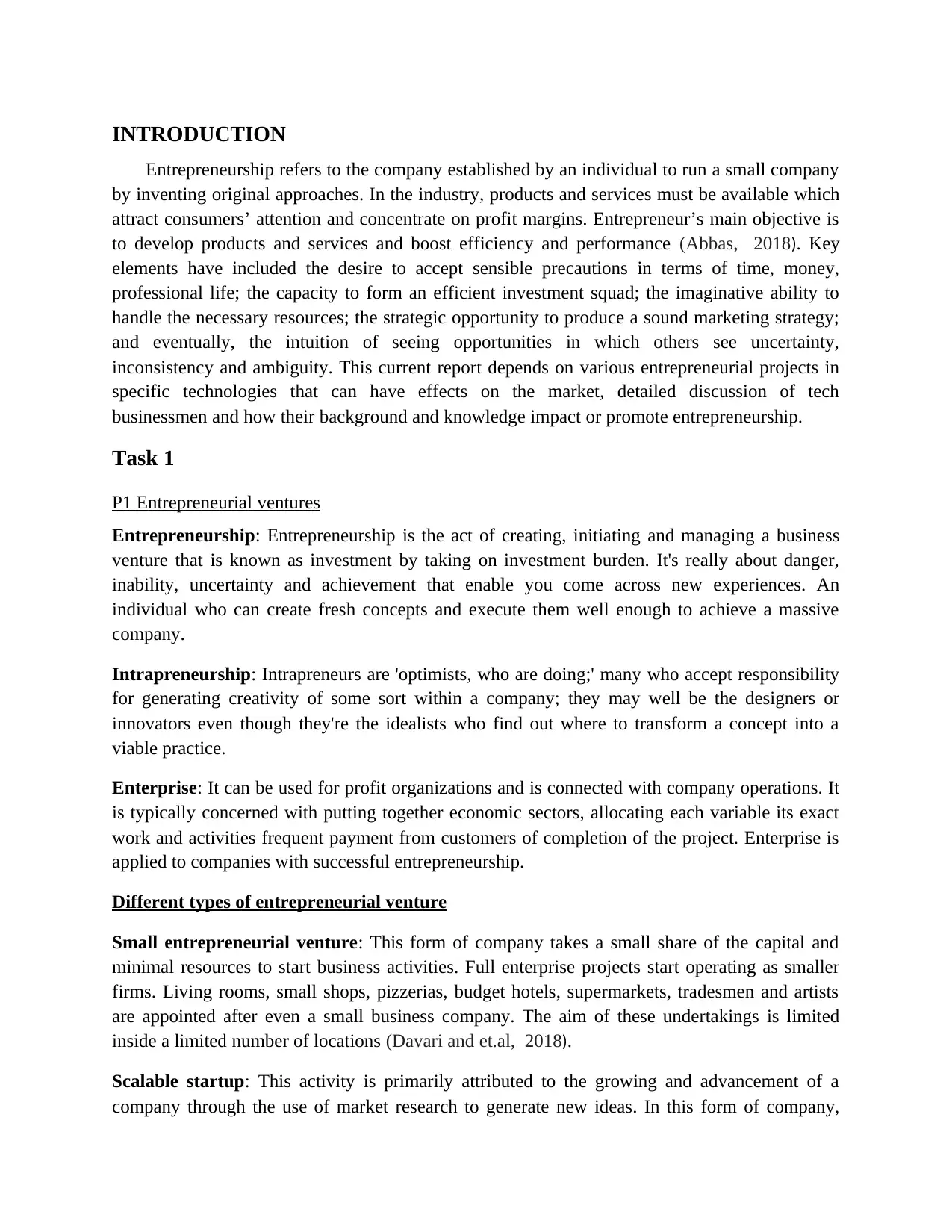
INTRODUCTION
Entrepreneurship refers to the company established by an individual to run a small company
by inventing original approaches. In the industry, products and services must be available which
attract consumers’ attention and concentrate on profit margins. Entrepreneur’s main objective is
to develop products and services and boost efficiency and performance (Abbas, 2018). Key
elements have included the desire to accept sensible precautions in terms of time, money,
professional life; the capacity to form an efficient investment squad; the imaginative ability to
handle the necessary resources; the strategic opportunity to produce a sound marketing strategy;
and eventually, the intuition of seeing opportunities in which others see uncertainty,
inconsistency and ambiguity. This current report depends on various entrepreneurial projects in
specific technologies that can have effects on the market, detailed discussion of tech
businessmen and how their background and knowledge impact or promote entrepreneurship.
Task 1
P1 Entrepreneurial ventures
Entrepreneurship: Entrepreneurship is the act of creating, initiating and managing a business
venture that is known as investment by taking on investment burden. It's really about danger,
inability, uncertainty and achievement that enable you come across new experiences. An
individual who can create fresh concepts and execute them well enough to achieve a massive
company.
Intrapreneurship: Intrapreneurs are 'optimists, who are doing;' many who accept responsibility
for generating creativity of some sort within a company; they may well be the designers or
innovators even though they're the idealists who find out where to transform a concept into a
viable practice.
Enterprise: It can be used for profit organizations and is connected with company operations. It
is typically concerned with putting together economic sectors, allocating each variable its exact
work and activities frequent payment from customers of completion of the project. Enterprise is
applied to companies with successful entrepreneurship.
Different types of entrepreneurial venture
Small entrepreneurial venture: This form of company takes a small share of the capital and
minimal resources to start business activities. Full enterprise projects start operating as smaller
firms. Living rooms, small shops, pizzerias, budget hotels, supermarkets, tradesmen and artists
are appointed after even a small business company. The aim of these undertakings is limited
inside a limited number of locations (Davari and et.al, 2018).
Scalable startup: This activity is primarily attributed to the growing and advancement of a
company through the use of market research to generate new ideas. In this form of company,
Entrepreneurship refers to the company established by an individual to run a small company
by inventing original approaches. In the industry, products and services must be available which
attract consumers’ attention and concentrate on profit margins. Entrepreneur’s main objective is
to develop products and services and boost efficiency and performance (Abbas, 2018). Key
elements have included the desire to accept sensible precautions in terms of time, money,
professional life; the capacity to form an efficient investment squad; the imaginative ability to
handle the necessary resources; the strategic opportunity to produce a sound marketing strategy;
and eventually, the intuition of seeing opportunities in which others see uncertainty,
inconsistency and ambiguity. This current report depends on various entrepreneurial projects in
specific technologies that can have effects on the market, detailed discussion of tech
businessmen and how their background and knowledge impact or promote entrepreneurship.
Task 1
P1 Entrepreneurial ventures
Entrepreneurship: Entrepreneurship is the act of creating, initiating and managing a business
venture that is known as investment by taking on investment burden. It's really about danger,
inability, uncertainty and achievement that enable you come across new experiences. An
individual who can create fresh concepts and execute them well enough to achieve a massive
company.
Intrapreneurship: Intrapreneurs are 'optimists, who are doing;' many who accept responsibility
for generating creativity of some sort within a company; they may well be the designers or
innovators even though they're the idealists who find out where to transform a concept into a
viable practice.
Enterprise: It can be used for profit organizations and is connected with company operations. It
is typically concerned with putting together economic sectors, allocating each variable its exact
work and activities frequent payment from customers of completion of the project. Enterprise is
applied to companies with successful entrepreneurship.
Different types of entrepreneurial venture
Small entrepreneurial venture: This form of company takes a small share of the capital and
minimal resources to start business activities. Full enterprise projects start operating as smaller
firms. Living rooms, small shops, pizzerias, budget hotels, supermarkets, tradesmen and artists
are appointed after even a small business company. The aim of these undertakings is limited
inside a limited number of locations (Davari and et.al, 2018).
Scalable startup: This activity is primarily attributed to the growing and advancement of a
company through the use of market research to generate new ideas. In this form of company,
Paraphrase This Document
Need a fresh take? Get an instant paraphrase of this document with our AI Paraphraser
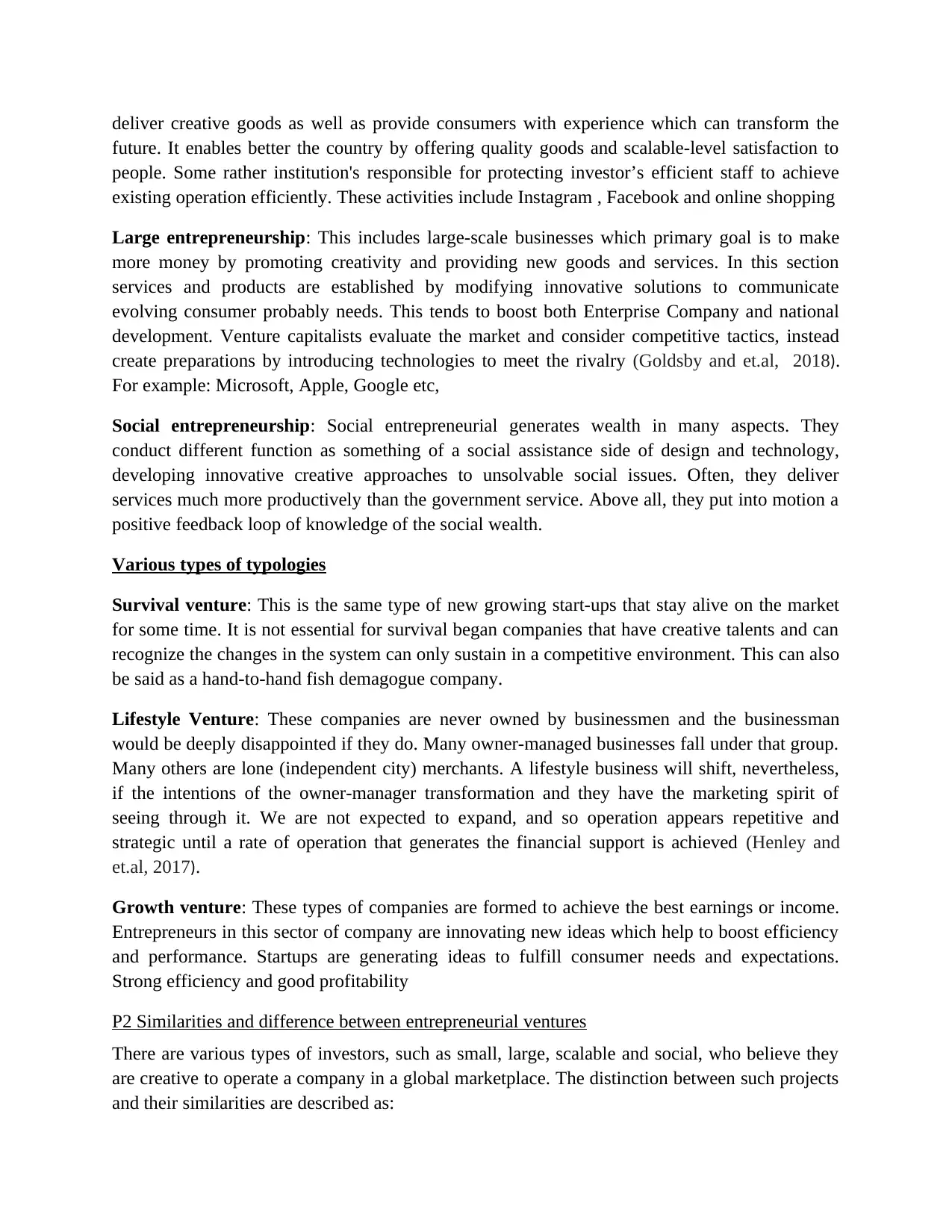
deliver creative goods as well as provide consumers with experience which can transform the
future. It enables better the country by offering quality goods and scalable-level satisfaction to
people. Some rather institution's responsible for protecting investor’s efficient staff to achieve
existing operation efficiently. These activities include Instagram , Facebook and online shopping
Large entrepreneurship: This includes large-scale businesses which primary goal is to make
more money by promoting creativity and providing new goods and services. In this section
services and products are established by modifying innovative solutions to communicate
evolving consumer probably needs. This tends to boost both Enterprise Company and national
development. Venture capitalists evaluate the market and consider competitive tactics, instead
create preparations by introducing technologies to meet the rivalry (Goldsby and et.al, 2018).
For example: Microsoft, Apple, Google etc,
Social entrepreneurship: Social entrepreneurial generates wealth in many aspects. They
conduct different function as something of a social assistance side of design and technology,
developing innovative creative approaches to unsolvable social issues. Often, they deliver
services much more productively than the government service. Above all, they put into motion a
positive feedback loop of knowledge of the social wealth.
Various types of typologies
Survival venture: This is the same type of new growing start-ups that stay alive on the market
for some time. It is not essential for survival began companies that have creative talents and can
recognize the changes in the system can only sustain in a competitive environment. This can also
be said as a hand-to-hand fish demagogue company.
Lifestyle Venture: These companies are never owned by businessmen and the businessman
would be deeply disappointed if they do. Many owner-managed businesses fall under that group.
Many others are lone (independent city) merchants. A lifestyle business will shift, nevertheless,
if the intentions of the owner-manager transformation and they have the marketing spirit of
seeing through it. We are not expected to expand, and so operation appears repetitive and
strategic until a rate of operation that generates the financial support is achieved (Henley and
et.al, 2017).
Growth venture: These types of companies are formed to achieve the best earnings or income.
Entrepreneurs in this sector of company are innovating new ideas which help to boost efficiency
and performance. Startups are generating ideas to fulfill consumer needs and expectations.
Strong efficiency and good profitability
P2 Similarities and difference between entrepreneurial ventures
There are various types of investors, such as small, large, scalable and social, who believe they
are creative to operate a company in a global marketplace. The distinction between such projects
and their similarities are described as:
future. It enables better the country by offering quality goods and scalable-level satisfaction to
people. Some rather institution's responsible for protecting investor’s efficient staff to achieve
existing operation efficiently. These activities include Instagram , Facebook and online shopping
Large entrepreneurship: This includes large-scale businesses which primary goal is to make
more money by promoting creativity and providing new goods and services. In this section
services and products are established by modifying innovative solutions to communicate
evolving consumer probably needs. This tends to boost both Enterprise Company and national
development. Venture capitalists evaluate the market and consider competitive tactics, instead
create preparations by introducing technologies to meet the rivalry (Goldsby and et.al, 2018).
For example: Microsoft, Apple, Google etc,
Social entrepreneurship: Social entrepreneurial generates wealth in many aspects. They
conduct different function as something of a social assistance side of design and technology,
developing innovative creative approaches to unsolvable social issues. Often, they deliver
services much more productively than the government service. Above all, they put into motion a
positive feedback loop of knowledge of the social wealth.
Various types of typologies
Survival venture: This is the same type of new growing start-ups that stay alive on the market
for some time. It is not essential for survival began companies that have creative talents and can
recognize the changes in the system can only sustain in a competitive environment. This can also
be said as a hand-to-hand fish demagogue company.
Lifestyle Venture: These companies are never owned by businessmen and the businessman
would be deeply disappointed if they do. Many owner-managed businesses fall under that group.
Many others are lone (independent city) merchants. A lifestyle business will shift, nevertheless,
if the intentions of the owner-manager transformation and they have the marketing spirit of
seeing through it. We are not expected to expand, and so operation appears repetitive and
strategic until a rate of operation that generates the financial support is achieved (Henley and
et.al, 2017).
Growth venture: These types of companies are formed to achieve the best earnings or income.
Entrepreneurs in this sector of company are innovating new ideas which help to boost efficiency
and performance. Startups are generating ideas to fulfill consumer needs and expectations.
Strong efficiency and good profitability
P2 Similarities and difference between entrepreneurial ventures
There are various types of investors, such as small, large, scalable and social, who believe they
are creative to operate a company in a global marketplace. The distinction between such projects
and their similarities are described as:
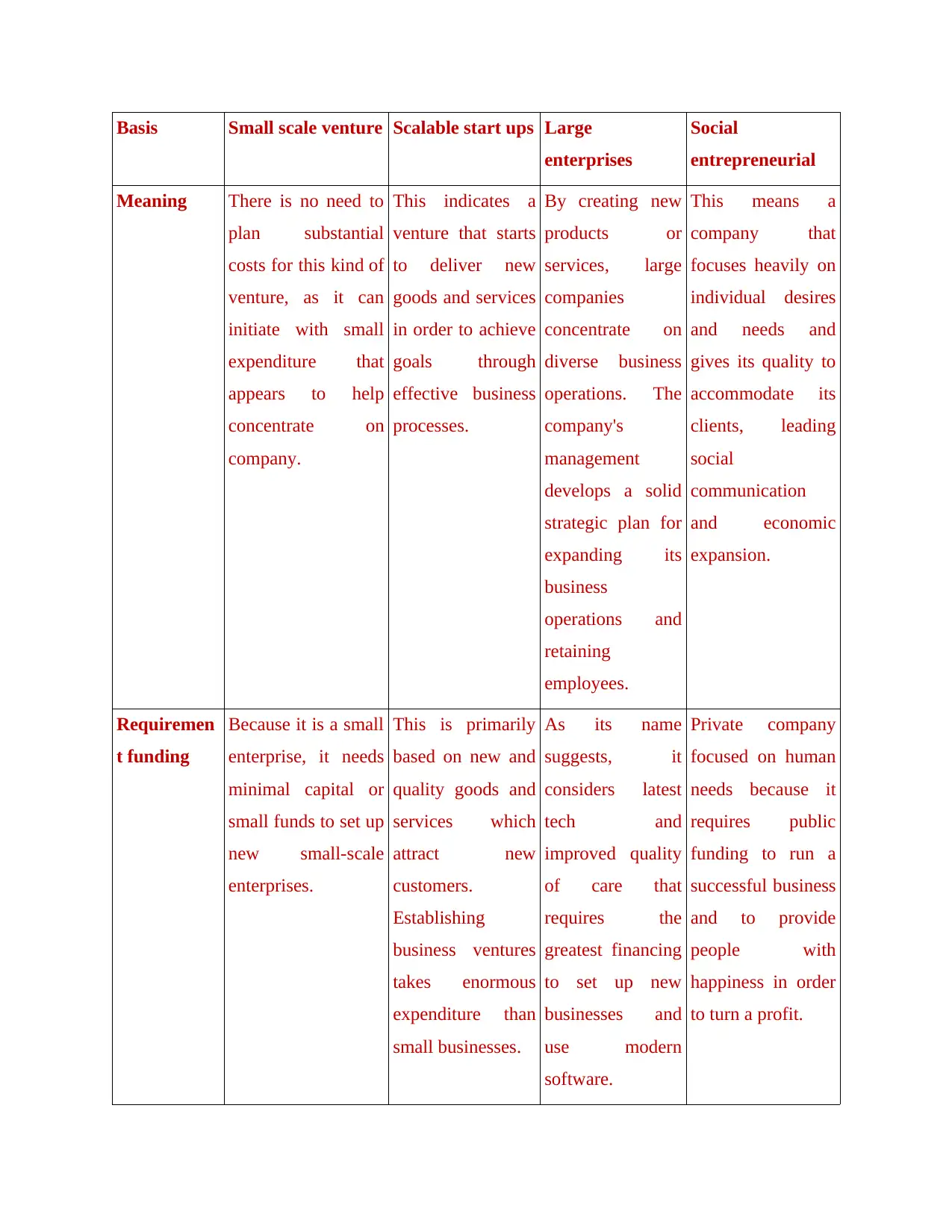
Basis Small scale venture Scalable start ups Large
enterprises
Social
entrepreneurial
Meaning There is no need to
plan substantial
costs for this kind of
venture, as it can
initiate with small
expenditure that
appears to help
concentrate on
company.
This indicates a
venture that starts
to deliver new
goods and services
in order to achieve
goals through
effective business
processes.
By creating new
products or
services, large
companies
concentrate on
diverse business
operations. The
company's
management
develops a solid
strategic plan for
expanding its
business
operations and
retaining
employees.
This means a
company that
focuses heavily on
individual desires
and needs and
gives its quality to
accommodate its
clients, leading
social
communication
and economic
expansion.
Requiremen
t funding
Because it is a small
enterprise, it needs
minimal capital or
small funds to set up
new small-scale
enterprises.
This is primarily
based on new and
quality goods and
services which
attract new
customers.
Establishing
business ventures
takes enormous
expenditure than
small businesses.
As its name
suggests, it
considers latest
tech and
improved quality
of care that
requires the
greatest financing
to set up new
businesses and
use modern
software.
Private company
focused on human
needs because it
requires public
funding to run a
successful business
and to provide
people with
happiness in order
to turn a profit.
enterprises
Social
entrepreneurial
Meaning There is no need to
plan substantial
costs for this kind of
venture, as it can
initiate with small
expenditure that
appears to help
concentrate on
company.
This indicates a
venture that starts
to deliver new
goods and services
in order to achieve
goals through
effective business
processes.
By creating new
products or
services, large
companies
concentrate on
diverse business
operations. The
company's
management
develops a solid
strategic plan for
expanding its
business
operations and
retaining
employees.
This means a
company that
focuses heavily on
individual desires
and needs and
gives its quality to
accommodate its
clients, leading
social
communication
and economic
expansion.
Requiremen
t funding
Because it is a small
enterprise, it needs
minimal capital or
small funds to set up
new small-scale
enterprises.
This is primarily
based on new and
quality goods and
services which
attract new
customers.
Establishing
business ventures
takes enormous
expenditure than
small businesses.
As its name
suggests, it
considers latest
tech and
improved quality
of care that
requires the
greatest financing
to set up new
businesses and
use modern
software.
Private company
focused on human
needs because it
requires public
funding to run a
successful business
and to provide
people with
happiness in order
to turn a profit.
⊘ This is a preview!⊘
Do you want full access?
Subscribe today to unlock all pages.

Trusted by 1+ million students worldwide
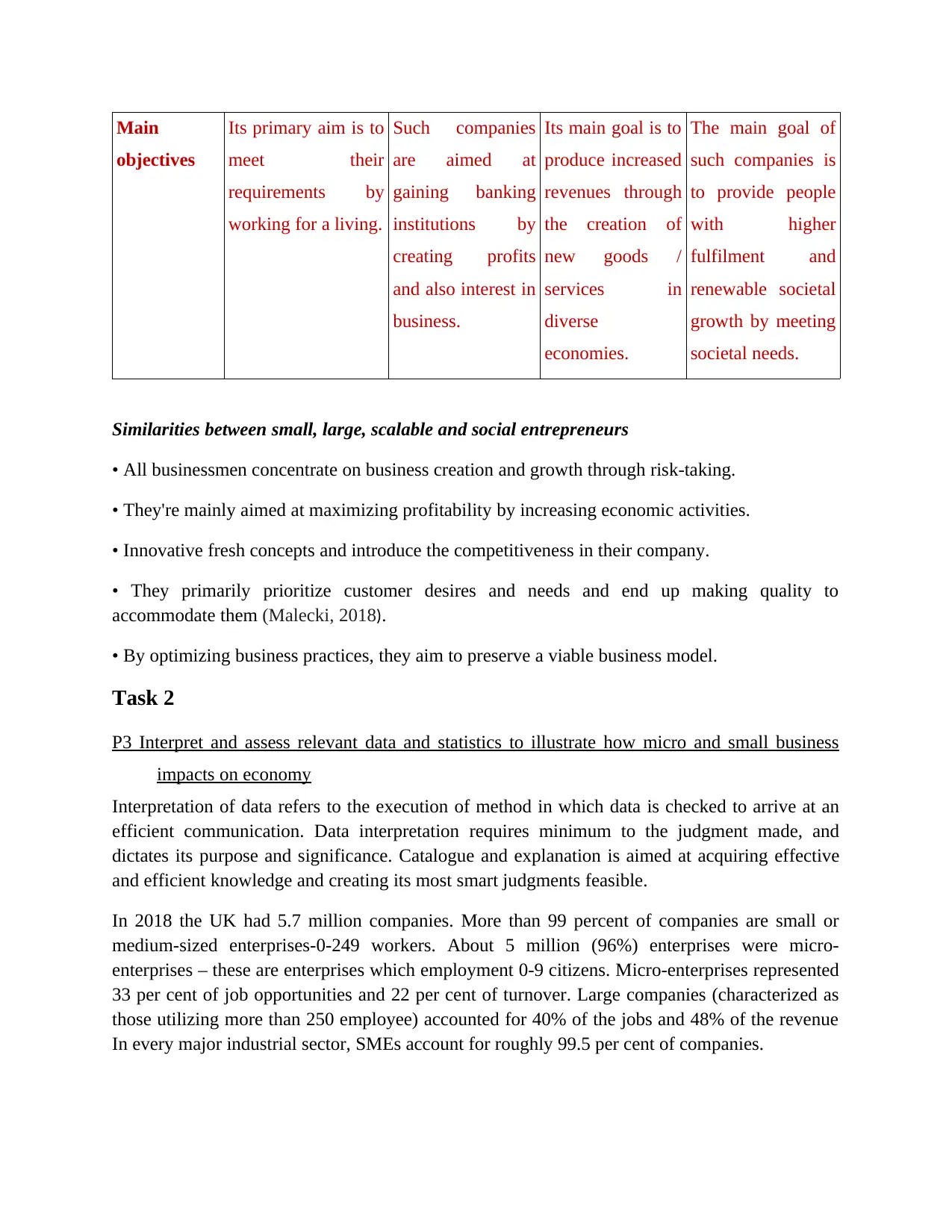
Main
objectives
Its primary aim is to
meet their
requirements by
working for a living.
Such companies
are aimed at
gaining banking
institutions by
creating profits
and also interest in
business.
Its main goal is to
produce increased
revenues through
the creation of
new goods /
services in
diverse
economies.
The main goal of
such companies is
to provide people
with higher
fulfilment and
renewable societal
growth by meeting
societal needs.
Similarities between small, large, scalable and social entrepreneurs
• All businessmen concentrate on business creation and growth through risk-taking.
• They're mainly aimed at maximizing profitability by increasing economic activities.
• Innovative fresh concepts and introduce the competitiveness in their company.
• They primarily prioritize customer desires and needs and end up making quality to
accommodate them (Malecki, 2018).
• By optimizing business practices, they aim to preserve a viable business model.
Task 2
P3 Interpret and assess relevant data and statistics to illustrate how micro and small business
impacts on economy
Interpretation of data refers to the execution of method in which data is checked to arrive at an
efficient communication. Data interpretation requires minimum to the judgment made, and
dictates its purpose and significance. Catalogue and explanation is aimed at acquiring effective
and efficient knowledge and creating its most smart judgments feasible.
In 2018 the UK had 5.7 million companies. More than 99 percent of companies are small or
medium-sized enterprises-0-249 workers. About 5 million (96%) enterprises were micro-
enterprises – these are enterprises which employment 0-9 citizens. Micro-enterprises represented
33 per cent of job opportunities and 22 per cent of turnover. Large companies (characterized as
those utilizing more than 250 employee) accounted for 40% of the jobs and 48% of the revenue
In every major industrial sector, SMEs account for roughly 99.5 per cent of companies.
objectives
Its primary aim is to
meet their
requirements by
working for a living.
Such companies
are aimed at
gaining banking
institutions by
creating profits
and also interest in
business.
Its main goal is to
produce increased
revenues through
the creation of
new goods /
services in
diverse
economies.
The main goal of
such companies is
to provide people
with higher
fulfilment and
renewable societal
growth by meeting
societal needs.
Similarities between small, large, scalable and social entrepreneurs
• All businessmen concentrate on business creation and growth through risk-taking.
• They're mainly aimed at maximizing profitability by increasing economic activities.
• Innovative fresh concepts and introduce the competitiveness in their company.
• They primarily prioritize customer desires and needs and end up making quality to
accommodate them (Malecki, 2018).
• By optimizing business practices, they aim to preserve a viable business model.
Task 2
P3 Interpret and assess relevant data and statistics to illustrate how micro and small business
impacts on economy
Interpretation of data refers to the execution of method in which data is checked to arrive at an
efficient communication. Data interpretation requires minimum to the judgment made, and
dictates its purpose and significance. Catalogue and explanation is aimed at acquiring effective
and efficient knowledge and creating its most smart judgments feasible.
In 2018 the UK had 5.7 million companies. More than 99 percent of companies are small or
medium-sized enterprises-0-249 workers. About 5 million (96%) enterprises were micro-
enterprises – these are enterprises which employment 0-9 citizens. Micro-enterprises represented
33 per cent of job opportunities and 22 per cent of turnover. Large companies (characterized as
those utilizing more than 250 employee) accounted for 40% of the jobs and 48% of the revenue
In every major industrial sector, SMEs account for roughly 99.5 per cent of companies.
Paraphrase This Document
Need a fresh take? Get an instant paraphrase of this document with our AI Paraphraser
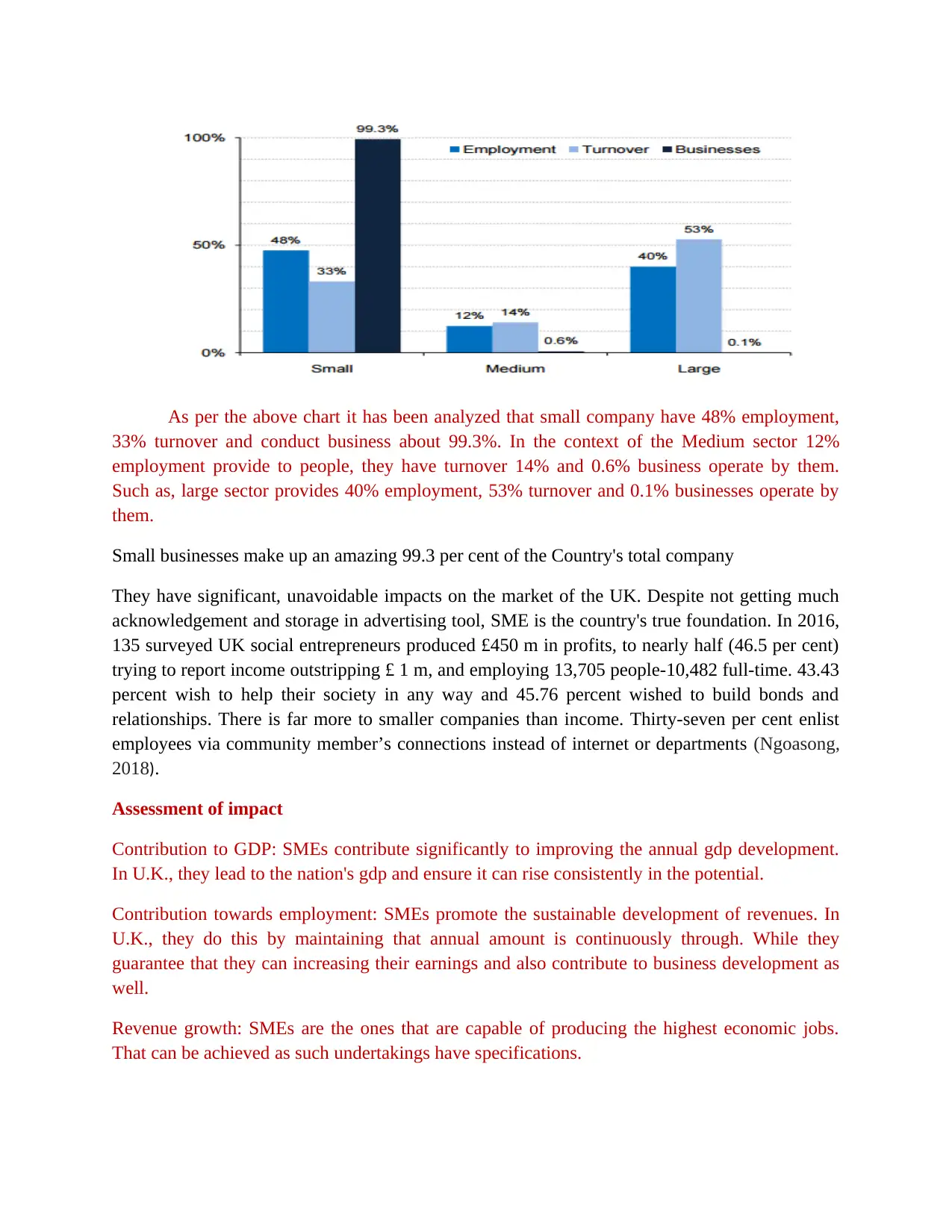
As per the above chart it has been analyzed that small company have 48% employment,
33% turnover and conduct business about 99.3%. In the context of the Medium sector 12%
employment provide to people, they have turnover 14% and 0.6% business operate by them.
Such as, large sector provides 40% employment, 53% turnover and 0.1% businesses operate by
them.
Small businesses make up an amazing 99.3 per cent of the Country's total company
They have significant, unavoidable impacts on the market of the UK. Despite not getting much
acknowledgement and storage in advertising tool, SME is the country's true foundation. In 2016,
135 surveyed UK social entrepreneurs produced £450 m in profits, to nearly half (46.5 per cent)
trying to report income outstripping £ 1 m, and employing 13,705 people-10,482 full-time. 43.43
percent wish to help their society in any way and 45.76 percent wished to build bonds and
relationships. There is far more to smaller companies than income. Thirty-seven per cent enlist
employees via community member’s connections instead of internet or departments (Ngoasong,
2018).
Assessment of impact
Contribution to GDP: SMEs contribute significantly to improving the annual gdp development.
In U.K., they lead to the nation's gdp and ensure it can rise consistently in the potential.
Contribution towards employment: SMEs promote the sustainable development of revenues. In
U.K., they do this by maintaining that annual amount is continuously through. While they
guarantee that they can increasing their earnings and also contribute to business development as
well.
Revenue growth: SMEs are the ones that are capable of producing the highest economic jobs.
That can be achieved as such undertakings have specifications.
33% turnover and conduct business about 99.3%. In the context of the Medium sector 12%
employment provide to people, they have turnover 14% and 0.6% business operate by them.
Such as, large sector provides 40% employment, 53% turnover and 0.1% businesses operate by
them.
Small businesses make up an amazing 99.3 per cent of the Country's total company
They have significant, unavoidable impacts on the market of the UK. Despite not getting much
acknowledgement and storage in advertising tool, SME is the country's true foundation. In 2016,
135 surveyed UK social entrepreneurs produced £450 m in profits, to nearly half (46.5 per cent)
trying to report income outstripping £ 1 m, and employing 13,705 people-10,482 full-time. 43.43
percent wish to help their society in any way and 45.76 percent wished to build bonds and
relationships. There is far more to smaller companies than income. Thirty-seven per cent enlist
employees via community member’s connections instead of internet or departments (Ngoasong,
2018).
Assessment of impact
Contribution to GDP: SMEs contribute significantly to improving the annual gdp development.
In U.K., they lead to the nation's gdp and ensure it can rise consistently in the potential.
Contribution towards employment: SMEs promote the sustainable development of revenues. In
U.K., they do this by maintaining that annual amount is continuously through. While they
guarantee that they can increasing their earnings and also contribute to business development as
well.
Revenue growth: SMEs are the ones that are capable of producing the highest economic jobs.
That can be achieved as such undertakings have specifications.
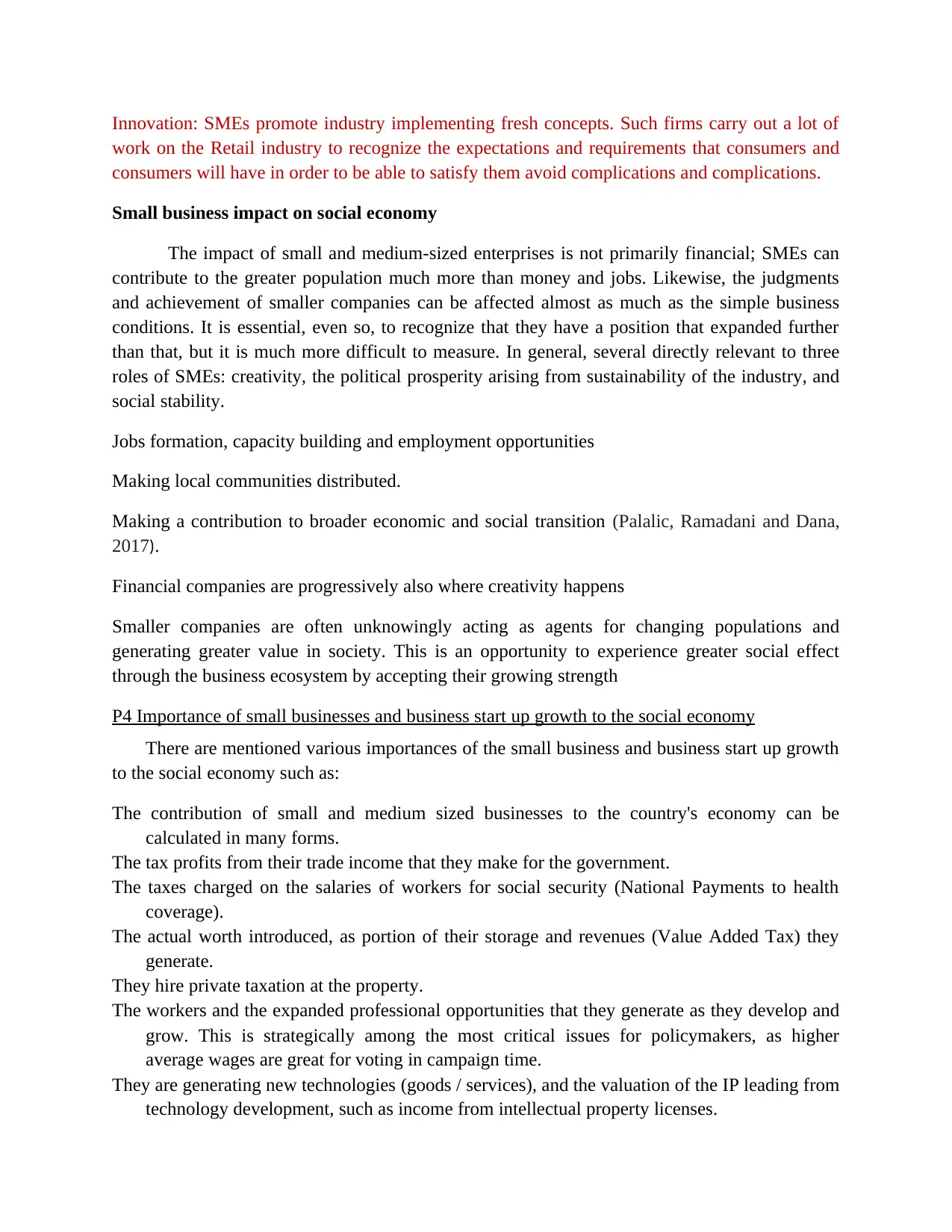
Innovation: SMEs promote industry implementing fresh concepts. Such firms carry out a lot of
work on the Retail industry to recognize the expectations and requirements that consumers and
consumers will have in order to be able to satisfy them avoid complications and complications.
Small business impact on social economy
The impact of small and medium-sized enterprises is not primarily financial; SMEs can
contribute to the greater population much more than money and jobs. Likewise, the judgments
and achievement of smaller companies can be affected almost as much as the simple business
conditions. It is essential, even so, to recognize that they have a position that expanded further
than that, but it is much more difficult to measure. In general, several directly relevant to three
roles of SMEs: creativity, the political prosperity arising from sustainability of the industry, and
social stability.
Jobs formation, capacity building and employment opportunities
Making local communities distributed.
Making a contribution to broader economic and social transition (Palalic, Ramadani and Dana,
2017).
Financial companies are progressively also where creativity happens
Smaller companies are often unknowingly acting as agents for changing populations and
generating greater value in society. This is an opportunity to experience greater social effect
through the business ecosystem by accepting their growing strength
P4 Importance of small businesses and business start up growth to the social economy
There are mentioned various importances of the small business and business start up growth
to the social economy such as:
The contribution of small and medium sized businesses to the country's economy can be
calculated in many forms.
The tax profits from their trade income that they make for the government.
The taxes charged on the salaries of workers for social security (National Payments to health
coverage).
The actual worth introduced, as portion of their storage and revenues (Value Added Tax) they
generate.
They hire private taxation at the property.
The workers and the expanded professional opportunities that they generate as they develop and
grow. This is strategically among the most critical issues for policymakers, as higher
average wages are great for voting in campaign time.
They are generating new technologies (goods / services), and the valuation of the IP leading from
technology development, such as income from intellectual property licenses.
work on the Retail industry to recognize the expectations and requirements that consumers and
consumers will have in order to be able to satisfy them avoid complications and complications.
Small business impact on social economy
The impact of small and medium-sized enterprises is not primarily financial; SMEs can
contribute to the greater population much more than money and jobs. Likewise, the judgments
and achievement of smaller companies can be affected almost as much as the simple business
conditions. It is essential, even so, to recognize that they have a position that expanded further
than that, but it is much more difficult to measure. In general, several directly relevant to three
roles of SMEs: creativity, the political prosperity arising from sustainability of the industry, and
social stability.
Jobs formation, capacity building and employment opportunities
Making local communities distributed.
Making a contribution to broader economic and social transition (Palalic, Ramadani and Dana,
2017).
Financial companies are progressively also where creativity happens
Smaller companies are often unknowingly acting as agents for changing populations and
generating greater value in society. This is an opportunity to experience greater social effect
through the business ecosystem by accepting their growing strength
P4 Importance of small businesses and business start up growth to the social economy
There are mentioned various importances of the small business and business start up growth
to the social economy such as:
The contribution of small and medium sized businesses to the country's economy can be
calculated in many forms.
The tax profits from their trade income that they make for the government.
The taxes charged on the salaries of workers for social security (National Payments to health
coverage).
The actual worth introduced, as portion of their storage and revenues (Value Added Tax) they
generate.
They hire private taxation at the property.
The workers and the expanded professional opportunities that they generate as they develop and
grow. This is strategically among the most critical issues for policymakers, as higher
average wages are great for voting in campaign time.
They are generating new technologies (goods / services), and the valuation of the IP leading from
technology development, such as income from intellectual property licenses.
⊘ This is a preview!⊘
Do you want full access?
Subscribe today to unlock all pages.

Trusted by 1+ million students worldwide
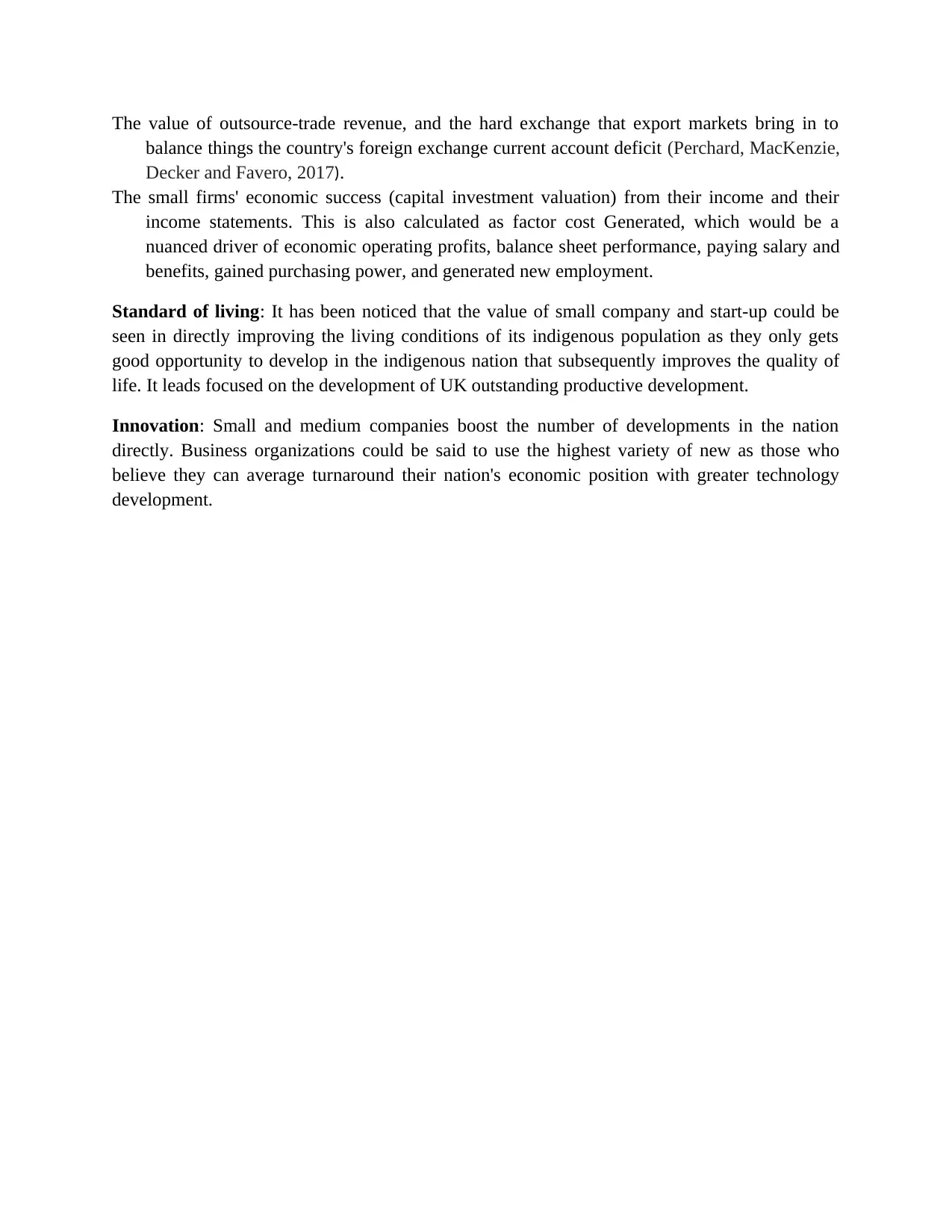
The value of outsource-trade revenue, and the hard exchange that export markets bring in to
balance things the country's foreign exchange current account deficit (Perchard, MacKenzie,
Decker and Favero, 2017).
The small firms' economic success (capital investment valuation) from their income and their
income statements. This is also calculated as factor cost Generated, which would be a
nuanced driver of economic operating profits, balance sheet performance, paying salary and
benefits, gained purchasing power, and generated new employment.
Standard of living: It has been noticed that the value of small company and start-up could be
seen in directly improving the living conditions of its indigenous population as they only gets
good opportunity to develop in the indigenous nation that subsequently improves the quality of
life. It leads focused on the development of UK outstanding productive development.
Innovation: Small and medium companies boost the number of developments in the nation
directly. Business organizations could be said to use the highest variety of new as those who
believe they can average turnaround their nation's economic position with greater technology
development.
balance things the country's foreign exchange current account deficit (Perchard, MacKenzie,
Decker and Favero, 2017).
The small firms' economic success (capital investment valuation) from their income and their
income statements. This is also calculated as factor cost Generated, which would be a
nuanced driver of economic operating profits, balance sheet performance, paying salary and
benefits, gained purchasing power, and generated new employment.
Standard of living: It has been noticed that the value of small company and start-up could be
seen in directly improving the living conditions of its indigenous population as they only gets
good opportunity to develop in the indigenous nation that subsequently improves the quality of
life. It leads focused on the development of UK outstanding productive development.
Innovation: Small and medium companies boost the number of developments in the nation
directly. Business organizations could be said to use the highest variety of new as those who
believe they can average turnaround their nation's economic position with greater technology
development.
Paraphrase This Document
Need a fresh take? Get an instant paraphrase of this document with our AI Paraphraser

Task 3

⊘ This is a preview!⊘
Do you want full access?
Subscribe today to unlock all pages.

Trusted by 1+ million students worldwide
1 out of 18
Related Documents
Your All-in-One AI-Powered Toolkit for Academic Success.
+13062052269
info@desklib.com
Available 24*7 on WhatsApp / Email
![[object Object]](/_next/static/media/star-bottom.7253800d.svg)
Unlock your academic potential
Copyright © 2020–2025 A2Z Services. All Rights Reserved. Developed and managed by ZUCOL.





